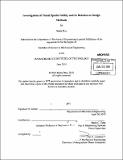Investigation of visual spatial ability and its relation to design methods
Author(s)
Prus, Maria (Maria Nicole)
DownloadFull printable version (2.140Mb)
Other Contributors
Massachusetts Institute of Technology. Dept. of Mechanical Engineering.
Advisor
Maria C. Yang.
Terms of use
Metadata
Show full item recordAbstract
The purpose of the study was to determine if a significant correlation exists between visual spatial ability and the construction of both two and three dimensional models and previous experience using the skills involved in these two subset subject areas of engineering prototype design. Mechanical engineering undergraduate seniors were given a spatial intelligence test known as the Paper Folding Test, a 6 minute test created by the Educational Testing Service. They were also asked to create an origami figure given a set of instructions lacking any written description, only images of the paper folds and rotations. This test will be timed and the length of time to complete the origami task will be compared to the student's scores on the Paper folding test and to their self reported experience levels in CAD, sketch model, and origami figure creation. The participants were also asked about the difficulty or ease they experienced completing each test. A significant correlation existed between the scores on the Paper Folding Test and the origami exercise completion times. Subjects with the fastest origami figure completion times tended to receive a higher score on the Paper Folding Test. Additionally, subjects with more than basic origami experience correlated significantly with receiving higher scores on the Paper Folding Test. No other correlations between previous experience and test score success were determined significant.
Description
Thesis (S.B.)--Massachusetts Institute of Technology, Dept. of Mechanical Engineering, 2010. Cataloged from PDF version of thesis. Includes bibliographical references (p. 39).
Date issued
2010Department
Massachusetts Institute of Technology. Department of Mechanical EngineeringPublisher
Massachusetts Institute of Technology
Keywords
Mechanical Engineering.